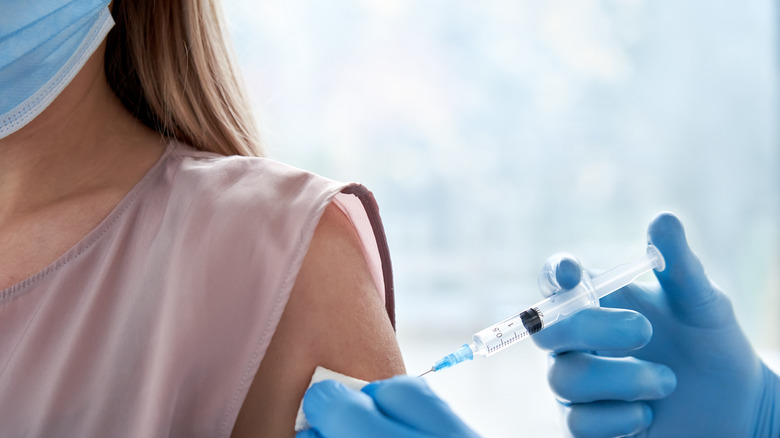Can The COVID-19 Vaccine Change Your Menstrual Cycle?
A new global study supports findings from earlier studies that indicated women who received the COVID-19 vaccine might experience changes in their menstrual cycles. The effects of COVID vaccines on menstrual cycles were largely overlooked in the chaos of early pandemic response amid worldwide exuberance around the development and release of the various brands and types of COVID vaccines. Dr. Alison Edelman, M.D., M.P.H., lead investigator of the new study and division director of Complex Family Planning in the OHSU School of Medicine, hoped the study results could help validate symptoms many women were reporting (via OHSU).
Edelman says, "Menstruation is woefully understudied, which is troubling considering it is a key indicator of fertility and overall health." According to Science, women began reporting changes to their menstrual cycles in early 2021, shortly after the vaccines became widely available. OHSU said that commonly reported menstrual effects after receiving a vaccine included missed periods, longer or shorter cycles, changes in menstrual volume, and spotting between cycles.
Study shows COVID-19 vaccine can lengthen menstrual cycle
Earlier studies found that various COVID-19 vaccines caused small, temporary changes in menstrual cycles. One study, funded by the National Institutes of Health, looked at 3,959 women, 2,403 vaccinated and 1,556 unvaccinated at the time of the survey. The Apple Women's Health Study looked at more than 125,000 menstrual cycles, including data from 9,652 individuals, with 8,486 vaccinated and 1,166 unvaccinated (via Harvard T.H. Chan School of Public Health). Both surveys showed that menstrual cycles lengthened slightly between bleeding, but the number of days during actual menses was not affected.
The new study, published in BMJ Medicine, observed 19,622 participants aged 18 to 45 years over four menstrual periods. Most of the subjects were under 35. People who received one dose of vaccine during a single cycle saw time between periods lengthen by about a day. But those who received two vaccine doses in a single cycle saw a more drastic increase in the menstrual cycle, by an average of 3.7 days. However, 13.5% of participants experienced cycles lengthened by eight days or more (per OHSU) after vaccination. The type of vaccine didn't seem to make a difference.
Of the results, Edelman said, "Changes to routine bodily functions can be alarming, and cause fear and anxiety. We want to emphasize that the menstrual cycle changes at a population level are small and typically resolve in the cycle after vaccination. Hopefully this knowledge provides clarity about what people can expect after getting vaccinated."


